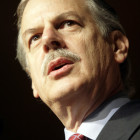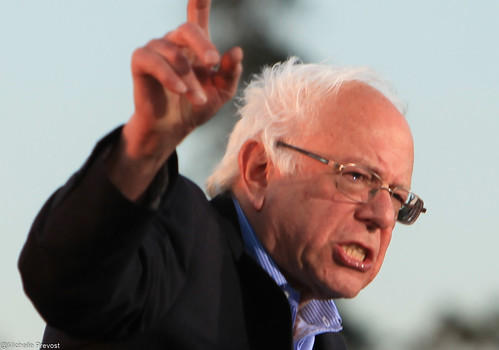From The Nation
Clinton and Obama holdovers may control the Democratic Party's machinery, but they no longer set the agenda.
As the New Hampshire primary results came in, political pundits designated Senator Bernie Sanders the Democratic Party's front-runner. After winning the popular vote in Iowa and New Hampshire, Sanders is the odds-on favorite to win or place in the next two contests.
He's the only one of the three current leaders who has demonstrated any support from people of color; the only one with the resources and organization to compete nationally. This realization will inevitably ignite a furious assault by the Democratic establishment and the mainstream media to take Sanders down.
Whether they can succeed remains to be seen, but before the scurrilous barrage is unleashed, let us pause to pay tribute to what Sanders has already wonand the scope of his ambitions going forward.
The Ideas PrimarySanders and his supporters have won what The Nation has dubbed the "ideas primary." His agenda now frames the debate in the Democratic Party. Every remaining candidate -- with the yet-to-be-defined possible exception of Michael Bloomberg -- now endorses doubling the minimum wage, guaranteeing health care for all, making college more affordable, empowering workers to organize, taking on catastrophic climate change, and raising taxes on the rich to pay to invest in America. All promise to get out of America's endless wars; all decry the trade treaties forged with bipartisan support over the last decades. Even Bloomberg now claims that redressing "inequality" is a major priority. Clintonistas and Obamanauts may still control the party's formal and informal machinery, but they no longer dominate its ideas -- or set its agenda.
The Money PrimaryRemarkably, Sanders is also winning the money primary. He has proved that a candidate willing to take on big money in politics can not be only financially competitive but also raise the most dough (with, of course, the exception of Michael Bloomberg's personal checking account). Last month, Sanders announced that he had raised -- in 1.3 million small contributions, and without spending any time wooing big donors -- a record $25 million, more than any other candidate raised in a full quarter last year. With more than 1.5 million individual donors and 130,000 recurring donors, Sanders will have the resources to compete in the monster primaries of Super Tuesday and across the country. And his network of supporters -- independent of party lists -- could provide a powerful resource for insurgent progressive candidates going forward, if Sanders makes arrangements to share the lists. Given the distorting influence of big money on our politics, that would be, as Joe Biden might say, a BFD.
A Movement CampaignBy temperament a loner, Sanders is transforming traditional electoral politics by building a movement candidacy. Like Jesse Jackson and Barack Obama, his candidacy has reached out to activist groups. He's joined Fight for Fifteen picket lines in the battle for a minimum wage. He's dispatched volunteers to support striking workers and stand with those protesting the baby cages on our border. He helped push Amazon to lift its minimum wage to $15 an hour. His commitment has enlisted movement and community organizations -- People's Action, Center for Popular Democracy, Make the Road Action, Sunrise Movement, Democratic Socialists of America, and myriad other local environmental, Latino, and poverty groups into endorsing his campaign. Sanders leads among younger black and Latino voters, providing young insurgents with a vehicle to challenge older leaders at the local level.
His campaign has poured resources and energy into what is called distributed organizing -- enlisting and relying on volunteers to bring in their friends and to persuade them to get involved. His focus is clear: "We win when turnout is high; we lose when it is low."
By the end of 2019, volunteers had hosted more than 45,000 events, made more than 11 million phone calls and sent more than 88 million text messages. Sanders is the only campaign close to being competitive with the Trump operation that Republicans are driving.
Thus far, these efforts have yet to bear much fruit, with disappointing turnout in Iowa and New Hampshire. And in the coming face-off against Michael Bloomberg's big-money ad campaigns, the strategy will get its biggest test.
What's clear, however, is that the effort contributes to the extraordinary support Sanders enjoys among the young. His candidacy has played a major role at bringing single-issue groups and activists, often turned off by traditional politics, to see the importance of electoral politics.
Establishment Democrats and pundits scorn Sanders's call for a "political revolution." But the changes the country needs won't occur because Republicans, as Biden suggests, suddenly have an "epiphany" if he's elected. Nor will they result from Klobuchar's theory of working across the aisle, or from Buttigieg's sonorous odes to national unity. Sanders is surely far more realistic when he says that the changes we need require taking on the entrenched interests that have rigged a system to work for them -- which in turn requires building a popular movement that stays active after the election and forces politicians to respond. Whether Sanders wins the nomination or the presidency, his commitment to building this movement is likely to be a lasting legacy.
A New Democratic Majority CoalitionSander's campaign is explicitly challenging the default Whole Foods coalition of the current Democratic Party that seeks to unite professionals, suburbanites, and social liberals with people of color. As Republicans used race-baiting to win inroads among dispossessed white working people over the last decades, Democrats were complacent, assuming that, as Chuck Schumer boasted in 2016, "For every blue-collar Democrat we lose in western Pennsylvania, we will pick up two moderate Republicans in the suburbs in Philadelphia, and you can repeat that in Ohio and Illinois and Wisconsin." That fantasy helped put the most unpopular presidential candidate in the history of polling into the White House.
(Note: You can view every article as one long page if you sign up as an Advocate Member, or higher).






